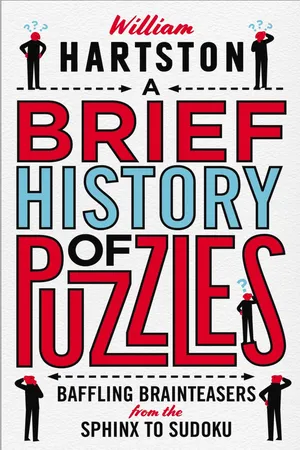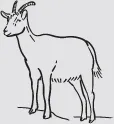
eBook - ePub
A Brief History of Puzzles
120 of the World's Most Baffling Brainteasers from the Sphinx to Sudoku
- English
- ePUB (mobile friendly)
- Available on iOS & Android
eBook - ePub
A Brief History of Puzzles
120 of the World's Most Baffling Brainteasers from the Sphinx to Sudoku
About this book
From ancient riddles to modern Sudoku, people have been fascinated by puzzles. Whether they are seen as a glorious waste of time, a harmless way to spend a train journey or a valuable way of exercising the mind, the lure of puzzles has been irresistible. By using over a hundred of examples of the most mindbending, the most challenging, the most satisfying, or simply the most humorous of puzzles throughout the ages, William Hartston traces the development of brainteasers of all varieties and the increasing ingenuity of puzzle setters from ancient civilisations to modern puzzle crazes.
Frequently asked questions
Yes, you can cancel anytime from the Subscription tab in your account settings on the Perlego website. Your subscription will stay active until the end of your current billing period. Learn how to cancel your subscription.
No, books cannot be downloaded as external files, such as PDFs, for use outside of Perlego. However, you can download books within the Perlego app for offline reading on mobile or tablet. Learn more here.
Perlego offers two plans: Essential and Complete
- Essential is ideal for learners and professionals who enjoy exploring a wide range of subjects. Access the Essential Library with 800,000+ trusted titles and best-sellers across business, personal growth, and the humanities. Includes unlimited reading time and Standard Read Aloud voice.
- Complete: Perfect for advanced learners and researchers needing full, unrestricted access. Unlock 1.4M+ books across hundreds of subjects, including academic and specialized titles. The Complete Plan also includes advanced features like Premium Read Aloud and Research Assistant.
We are an online textbook subscription service, where you can get access to an entire online library for less than the price of a single book per month. With over 1 million books across 1000+ topics, we’ve got you covered! Learn more here.
Look out for the read-aloud symbol on your next book to see if you can listen to it. The read-aloud tool reads text aloud for you, highlighting the text as it is being read. You can pause it, speed it up and slow it down. Learn more here.
Yes! You can use the Perlego app on both iOS or Android devices to read anytime, anywhere — even offline. Perfect for commutes or when you’re on the go.
Please note we cannot support devices running on iOS 13 and Android 7 or earlier. Learn more about using the app.
Please note we cannot support devices running on iOS 13 and Android 7 or earlier. Learn more about using the app.
Yes, you can access A Brief History of Puzzles by William Hartston in PDF and/or ePUB format, as well as other popular books in Storia & Storia mondiale. We have over one million books available in our catalogue for you to explore.
Information
MEDIEVAL MATHS, MYSTERIES AND MERRIMENT

‘The ingenious study of making and solving puzzles is a science undoubtedly of most necessary acquirement, and deserves to make a part in the meditation of both sexes.’
Sir Thomas Fitzosborne, pseudonym of William Melmoth (1710–1799)
PUZZLES MAY HAVE begun in ancient times with riddles and teasing ways to introduce amusement into maths teaching but it took many more centuries before puzzles for puzzlement’s sake alone became acceptable.
Remarkably, the earliest known collection of something similar to modern recreational puzzles dates back more than 1,200 years. It was probably assembled by Alcuin of York (c.735–804), a highly influential scholar and reformer of the early Christian church who acted as an adviser to the court of Charlemagne.
I say ‘probably’ because there is no definite evidence that the puzzles associated with Alcuin were actually composed or even just collected by him – although the puzzles were discovered at Charlemagne’s court and one of Alcuin’s letters to Charlemagne refers to ‘subtle figures of arithmetic, for pleasure’, which he says are included in the correspondence. Several copies of these Propositiones ad acuendos iuvenes (Propositions to Sharpen the Young) have been found, containing either 53 or 56 problems, presumably depending on which scribe copied the original manuscript. Several of the problems have also been found to date from even earlier times, which supports the view that Alcuin, or whoever assembled the manuscript in the first place, was essentially a collector of puzzles rather than their originator. They may have been intended, in Alcuin’s words, as teaching devices to stimulate young minds, but the tone is impressively playful. Here are three of them, for which the solutions may be found at the end of this book.


A man and woman, each the weight of a cartload, with two children who together weigh as much as a cartload, have to cross a river. They find a boat but it can only take one cartload. Make the transfer if you can, without sinking the boat.


A man had to take a wolf, a goat and a bunch of cabbages across a river. The only boat he could find could only take two of them at a time. But he had been ordered to transfer all of these to the other side in good condition. How could this be done without leaving the wolf alone with the goat (as he might eat it), or the goat alone with the cabbages (as it might eat them)?



A certain boy addressed his father, saying, ‘Hello, father!’ His father answered, ‘Hello, my son. May you live to twice your present age and then at that time three times the age you will then be. If I gave you one of my years to add to this, then you will live to be 100 years old.’ How old was the boy at the time?
Alcuin’s river-crossing problems remain popular today, and several more convoluted versions have been concocted, often featuring cannibals and missionaries (who cannot be left with the former outnumbering the latter) or men and women (where no man can be left alone with another man’s wife) or criminals who cannot be left without a police escort. Here is a typically complex modern example from a source in China.


A man, a woman, two boys, two girls, a policeman and a crook need to cross a river but the boat will only hold two people. The children cannot row the boat; the man cannot be in the presence of a girl if the woman is not present, and the woman cannot be left with a boy unless the man is there. The crook cannot be alone with any of the family without the policeman. All you have to do is get them all across the river.
We shall meet a final river-crossing puzzle on page 42.
After Alcuin’s contributions in the eighth century, the world of puzzles seems to have stagnated for almost 400 years until another major contributor came along. This is not very surprising: mathematics and logic had hardly progressed since the days of Euclid and we were still a long way from the introduction of the printing press which would enable the rapid dissemination of books and knowledge. Europe was still hampered by having nothing better than Roman numerals to perform calculations with, and it should perhaps be no surprise that the man responsible for replacing them by the Arabic numbers with which we are now familiar was also the greatest puzzler of his time.
This man was Leonardo of Pisa, now better known as Fibonacci, which is the name associated with his famous sequence 1, 1, 2, 3, 5, 8, 13, 21 ... of which each number is the sum of the two preceding it. As well as having some remarkable mathematical properties, the Fibonacci sequence has various biological applications, particularly in the realm of population growth. The earliest reference to this sequence appears in a book called Liber Abaci (The Book of Calculation) written by Fibonacci in 1202 and forms our Puzzle 6.


A man keeps a pair of rabbits at a certain place surrounded by a wall. If the nature of these rabbits is that each pair gives birth to one new pair every month and they begin to breed in the second month afte...
Table of contents
- Cover
- Title
- Copyright
- Contents
- Acknowledgements
- 0 Primeval Puzzle Prelude
- 1 Medieval Maths, Mysteries and Merriment
- 2 Parisian Perplexities, Problems and Posers
- 3 The Great Victorian Puzzlers
- 4 Puzzles Worthy of the Name
- 5 More Word Puzzles
- 6 The Logic of Hats
- 7 The Most Baffling Logic of All
- 8 Weights, Measures, Speed
- 9 Psychological Puzzles
- 10 Miscellaneous and Mysterious
- The Prize Puzzle
- Solutions
- A Note about the Author